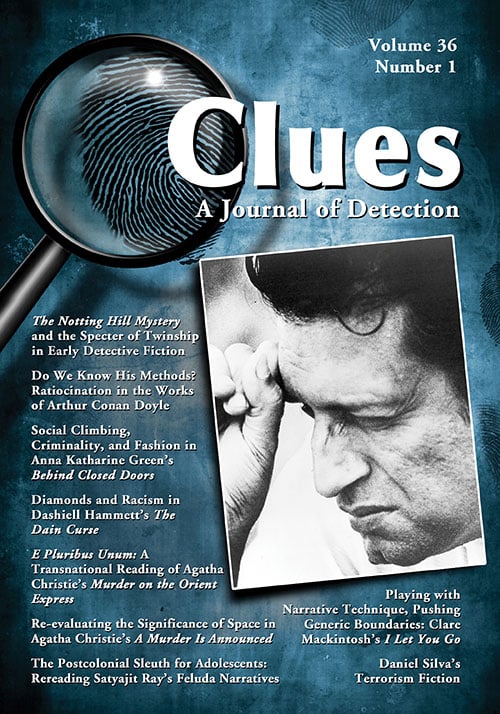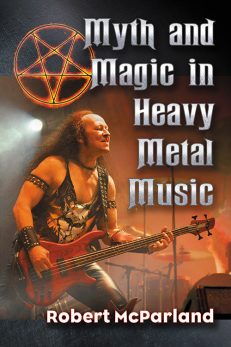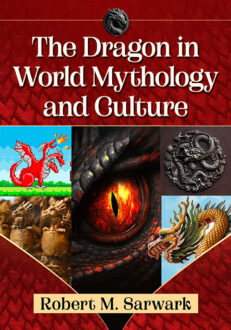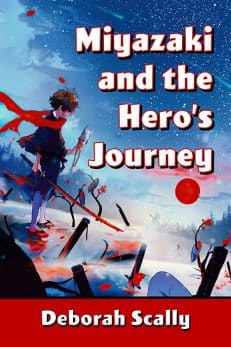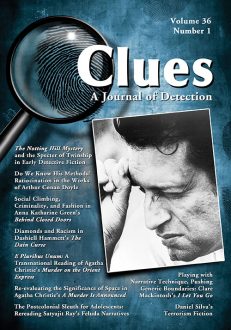Clues: A Journal of Detection, Vol. 36, No. 1 (Spring 2018)
Print Back Issue$30.00
In stock
About the Book
BACK ISSUE
This is a single back issue only. To order a current subscription, or for more information, please visit the journal’s web page at CluesJournal.com. Back issues from earlier volumes of Clues are available for order subject to availability. Also, single issues of the current volume may be ordered one at a time. Individuals may order back issues directly from our online catalog, and the charge for individuals is $30 (excluding postage). Issues from Volume 33 to the present are also available in ebook format on Kindle, Nook and Google Play.
The charge for single issues for institutions is $75 per issue (excluding postage). If your institution requires a back issue, please contact us to order at the appropriate rate.
About the Author(s)
Bibliographic Details
Executive Editor Janice M. Allan
Managing Editor Elizabeth Foxwell
Consulting Editor Margaret Kinsman
Format: softcover (7 x 10), back issue
Pages: 120
Bibliographic Info:
Copyright Date: 2018
ISSN 0742-4248
Imprint: McFarland
Table of Contents
Introduction
Janice M. Allan 5
The executive editor of Clues discusses the Table of Contents of Clues 36.1, including works by authors such as Agatha Christie, Arthur Conan Doyle, Charles Felix, Anna Katharine Green, Dashiell Hammett, Claire Macintosh, Satyajit Ray, and Daniel Silva.
E Pluribus Unum: A Transnational Reading of Agatha Christie’s Murder on the Orient Express
Stewart King 9
This article questions both the Englishness and generic stasis ascribed to Agatha Christie and argues that her Murder on the Orient Express (1933) displays an inherent transnationalism that questions the strict taxonomies supposedly separating the English clue-puzzle from the American private-eye novel.
Psychogeography and the Detective: Re-evaluating the Significance of Space in Agatha Christie’s A Murder Is Announced
Sarah Martin 20
The author discusses the nature of the village space and its influential role in plot, character, and structure of Agatha Christie’s A Murder Is Announced. The concept of psychogeography unearths the true nature of space and its influence on the construction and preservation of social identity in the book.
Do We Know His Methods? Ratiocination in the Works of Arthur Conan Doyle
Jackie Shead 30
This article discusses Arthur Conan Doyle’s explanation of Sherlock Holmes’s methods, contrasting them with his presentation of the detective in action. It explores contradictions in the Holmes stories, suggesting Conan Doyle’s investment in a hyperrational sleuth is at odds with his intuitive understanding of detective methodology.
Playing with Narrative Technique, Pushing Generic Boundaries: Clare Mackintosh’s I Let You Go
Heather Duerre Humann 41
Clare Mackintosh’s I Let You Go (2014) challenges and disrupts narrative boundaries, subverting readers’ expectations and causing them to question what they had taken for granted. The book also destabilizes generic boundaries by veering away from the traditional whodunit and incorporating traits of confessional literature and social protest fiction.
Dressing Up: Social Climbing, Criminality, and Fashion in Anna Katharine Green’s Behind Closed Doors
Claire Meldrum 48
The author discusses the role of the social climber in Anna Katharine Green’s Behind Closed Doors (1888), examining the role played by costume and dress in facilitating social performance and upward social movement in nineteenth-century American society. Imposture and criminality are considered as well as the parameters of the authentic and inauthentic in a period of widespread conspicuous consumption and mass production.
“It’s Never Twins?”—It’s Always Twins: The Notting Hill Mystery (1865) and the Specter of Twinship in Early Detective Fiction
Wieland Schwanebeck 58
Twins appear remarkably often in early Victorian detective fiction. Charles Felix’s recently rediscovered Notting Hill Mystery (1865) illustrates that twins always run the risk of exceeding the grasp of the detective’s comprehension, as well as that of contemporary science, and were thus integral as heuristic aids in the genre’s formation.
Diamonds and Racism in Dashiell Hammett’s The Dain Curse: An Intertextual Study
Matthew Bernstein 69
Written and published between Dashiell Hammett’s groundbreaking novels Red Harvest (1927) and The Maltese Falcon (1929), the controversial The Dain Curse (1928) has garnered little critical attention. However, the textual variants between the pulp installments and the Knopf publication—particularly elements related to racism—reveal that the novel is a significant fulcrum for understanding Hammett’s San Francisco.
The Postcolonial Sleuth for Adolescents: Rereading Satyajit Ray’s Feluda Narratives
Pinaki Roy 78
Well-known filmmaker Satyajit Ray (1921–92) created Bengali detective Feluda (aka Pradosh C. Mitter), who appears in a series of novels popular with young adult readers. This essay offers a postcolonial reading of select examples from Ray’s corpus.
Daniel Silva’s Terrorism Fiction
David Seed 90
From Prince of Fire (2005) onward, author Daniel Silva examines different aspects of contemporary terrorism. This represents a refocusing of history in the making rather than the retrospection of his earlier novels, as historical circumstances contextualize his subjects from the Middle East to the new Russia and the trade in stolen artifacts.
Mothers Hunting Murderers: Representations of Motherhood in Broadchurch and Happy Valley
Shauna Wilton 101
This article explores the emancipatory potential of the detective mother in the British television series Broadchurch and Happy Valley. It argues that, although mothers are often the objects of social and moral scrutiny, and detectives are often the agents enforcing social norms, the combination of these two roles in one character can both empower women and mothers as well as challenge stereotypical gender dichotomies.
Reviews
Audrey Parente. Once a Pulp Man: The Secret Life of Judson P. Philips as Hugh Pentecost. Rebekah Buchanan 111
Margaret Kinsman. Sara Paretsky: A Companion to the Mystery Fiction. Rachel Schaffer 112
Phyllis M. Betz. Katherine V. Forrest: A Critical Appreciation. Susan Rowland 114
Casey A. Cothran and Mercy Cannon, eds. New Perspectives on Detective Fiction: Mystery Magnified. Alexander N. Howe 115
Louise Nilsson, David Damrosch, and Theo D’haen, eds. Crime Fiction as World Literature. Mary Stoecklein 117
Author Guidelines 119
Book Reviews & Awards
- “Clues is a must-have for readers and writers of crime fiction. Scholarly, thought-provoking, wide-ranging in its topics, Clues covers the crime and thriller map.”—Sara Paretsky
- “A. Conan Doyle, notoriously resentful of Sherlock Holmes’s success, liked to scorn ‘police romances’ as less significant and worthy of his talents than his other literary work. If he could have read Clues, the thinking mystery reader’s journal, he would surely have felt differently—and learned much he never realized himself about even his own landmark contribution to the genre, from which so much else by others has flowed.”—Jon Lellenberg, U.S. agent for the Arthur Conan Doyle estate
- “I love reading Clues. Every issue provides thought-provoking, well-researched articles. The variety and scope of the material found in Clues makes an unparalleled, ongoing contribution to our understanding of the role of crime fiction in our culture, and the genre’s reflection of its time and society.”—Jan Burke, Edgar-winning author of The Messenger (2009)
- “Clues is an important journal. It carries the torch of tradition that is the backbone of detective fiction. It goes below the surface and gets to the heart of what makes the genre so fascinating and valid today”—Michael Connelly, author of the Harry Bosch novels, including The Overlook (2007)
- “For erudite and fascinating truths about mysteries, follow the clues to Clues, the scholarly journal that is an essential resource for every serious student of the mystery”—Carolyn Hart, author of Death Walked In (2008)
- “With scholarship ranging from Poe to Peters, nothing beats Clues”—Joan Hess, author of Mummy Dearest (2008).
Ebook Availability
Amazon (Kindle)
Apple
Barnes & Noble (Nook)
Google
Walmart & Kobo

